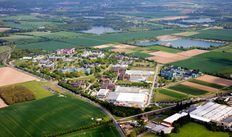- Bayer invests EUR 220 million in Monheim R&D facility.
- The new facility will house 200 employees and focus on sustainable crop protection.
- Construction is expected to take 3 years, with full commissioning by 2026.
- Bayer aims to reduce the environmental impact of crop protection products by 30% by 2030.

Investment in Sustainable Agriculture
Bayer is investing EUR 220 million in a new R&D facility at its Monheim site, marking the largest single investment in its Crop Protection business in Germany since 1979. The new Product Safety complex will include labs, offices, and a greenhouse area, accommodating around 200 employees. The focus will be on developing next-generation chemicals for sustainable agriculture and enhancing the safety of crop protection products.
Commitment to Innovation
The investment underscores Bayer's commitment to innovation in regenerative agriculture. The new facility aims to develop crop protection solutions with better environmental profiles, significantly reducing agriculture's impact on the environment. The construction period is expected to be around three years, with full commissioning planned for 2026.
Regulatory Compliance and Safety
The new building will support high-quality metabolism, human, and environmental data packages for thorough risk assessments. It will allow tests and studies to be conducted according to regulatory standards and under realistic conditions. The focus will be on environmental safety, including exposure studies and safety studies on non-target organisms like aquatic and soil organisms, wild birds, mammals, and pollinators.
Artificial Intelligence and Future Technologies
Bayer's new R&D facilities will leverage artificial intelligence and data science to design the next generation of crop protection. The CropKey innovation approach will enable the creation of solutions based on predefined safety and sustainability profiles. This investment aligns with Bayer's sustainability commitment to reduce the environmental impact of crop protection products by 30% by 2030.

